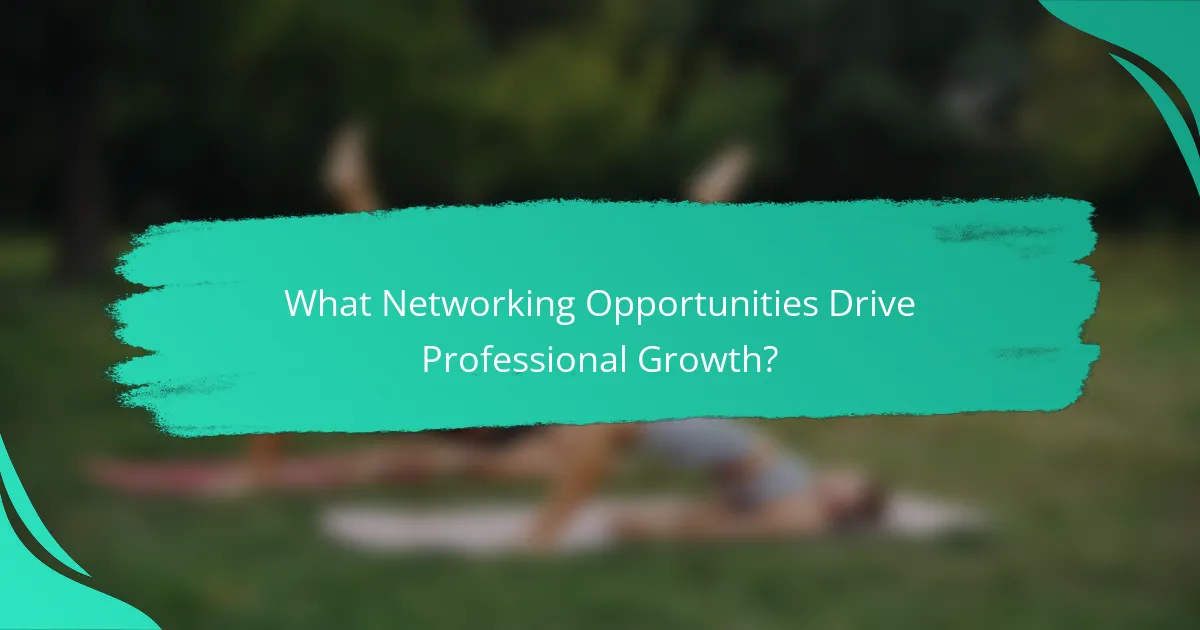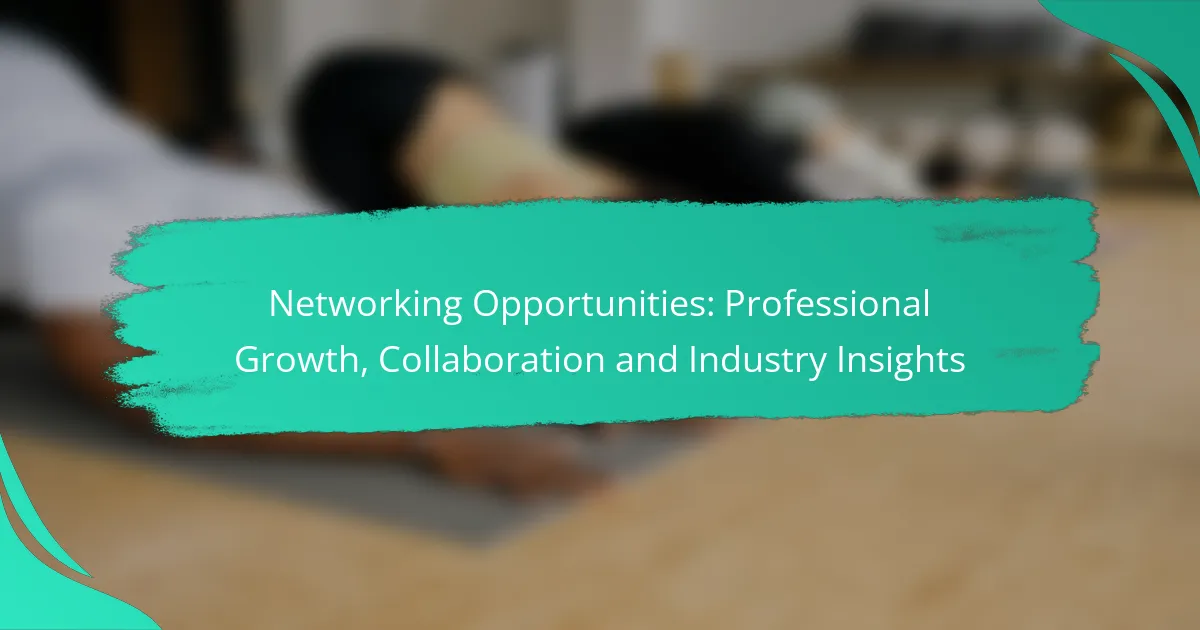Networking opportunities play a crucial role in professional growth by fostering connections and enabling knowledge sharing within various industries. By actively engaging in these opportunities, individuals can unlock career advancements, collaborate on impactful projects, and gain valuable insights into market trends.

What Networking Opportunities Drive Professional Growth?
Networking opportunities are essential for professional growth as they facilitate connections, knowledge sharing, and collaboration within industries. Engaging in these opportunities can lead to career advancements, partnerships, and valuable insights into market trends.
Mentorship programs
Mentorship programs connect less experienced professionals with seasoned experts who provide guidance and support. These relationships can enhance skills, expand networks, and offer insights into industry best practices.
When seeking a mentor, consider aligning with someone in your field whose experience and values resonate with your career goals. Regular meetings and open communication can maximize the benefits of this relationship.
Industry conferences
Industry conferences are gatherings where professionals share knowledge, showcase innovations, and network. Attending these events can provide insights into emerging trends and opportunities for collaboration.
To make the most of a conference, prepare by researching speakers and sessions relevant to your interests. Engage actively by asking questions and following up with new contacts after the event.
Online networking platforms
Online networking platforms, such as LinkedIn and industry-specific forums, allow professionals to connect and share resources globally. These platforms facilitate discussions, job opportunities, and collaborations without geographical limitations.
To leverage these platforms effectively, maintain an updated profile, participate in discussions, and connect with individuals who share similar interests or career paths. Regular engagement can enhance visibility and expand your network.
Workshops and seminars
Workshops and seminars provide hands-on learning experiences and opportunities to develop specific skills. These events often feature industry experts who share practical knowledge and insights.
To benefit from workshops, choose those that align with your career objectives and actively participate in discussions and activities. Networking with fellow attendees can also lead to valuable connections.
Networking events
Networking events are designed for professionals to meet and establish connections in a more informal setting. These gatherings can range from casual meetups to structured events with specific agendas.
When attending networking events, approach conversations with a clear intention of what you hope to gain. Bring business cards and be prepared to discuss your background and interests to foster meaningful connections.

How Can Collaboration Enhance Career Development?
Collaboration can significantly enhance career development by providing opportunities for shared learning, skill enhancement, and networking. Working with others allows professionals to gain diverse insights, expand their reach, and create impactful projects that can elevate their careers.
Joint projects
Engaging in joint projects is a powerful way to foster collaboration and career growth. These projects often combine the strengths of different team members, leading to innovative solutions and improved outcomes. For example, a marketing professional partnering with a data analyst can create more effective campaigns through data-driven insights.
When participating in joint projects, it’s essential to establish clear roles and responsibilities to avoid confusion. Regular communication and feedback can also help ensure that all team members are aligned and working towards common goals.
Cross-industry partnerships
Cross-industry partnerships open doors to new perspectives and opportunities. By collaborating with professionals from different sectors, individuals can gain insights into best practices and emerging trends that may not be present in their own industry. For instance, a tech company might collaborate with a healthcare provider to develop innovative health solutions.
To maximize the benefits of cross-industry partnerships, professionals should seek out partners whose strengths complement their own. Networking events and industry conferences can be excellent venues for initiating these partnerships and exploring potential synergies.
Collaborative tools
Utilizing collaborative tools can streamline teamwork and enhance productivity. Platforms like Slack, Trello, or Microsoft Teams facilitate communication and project management, making it easier for teams to collaborate effectively, regardless of their physical location. These tools often include features for file sharing, task tracking, and real-time updates.
When selecting collaborative tools, consider the specific needs of your team and the nature of your projects. It’s beneficial to choose tools that integrate well with existing workflows and provide user-friendly interfaces to encourage widespread adoption among team members.

What Are the Best Platforms for Networking?
The best platforms for networking include LinkedIn, Meetup, and Slack communities. Each platform offers unique features that facilitate professional growth, collaboration, and access to industry insights.
LinkedIn is the leading professional networking platform, allowing users to connect with colleagues, industry leaders, and potential employers. It features profiles that showcase work experience, skills, and endorsements, making it easier to establish credibility.
To maximize your LinkedIn presence, regularly update your profile, engage with posts, and join relevant groups. Consider sharing industry-related articles or insights to position yourself as a thought leader.
Meetup
Meetup is designed for organizing and attending local events based on shared interests, including professional networking groups. Users can find or create meetups that focus on specific industries or topics, facilitating face-to-face interactions.
To effectively use Meetup, search for groups in your area that align with your professional goals. Attend events consistently to build relationships and expand your network. Be proactive in introducing yourself and participating in discussions.
Slack communities
Slack communities are online spaces where professionals can collaborate, share insights, and network within specific industries or interests. These communities often feature channels dedicated to various topics, allowing for focused discussions.
Join relevant Slack communities by searching for invites online or through industry contacts. Engage actively by asking questions, sharing resources, and contributing to conversations. Be mindful of community guidelines to foster a positive networking environment.

How to Leverage Industry Insights for Growth?
Leveraging industry insights for growth involves utilizing data and information to make informed decisions that enhance professional development and collaboration. By tapping into resources such as market research, webinars, and networking opportunities, professionals can gain valuable perspectives that drive their careers forward.
Market research reports
Market research reports provide comprehensive analyses of industry trends, consumer behavior, and competitive landscapes. These documents can help professionals identify emerging opportunities and potential challenges within their sectors. Regularly reviewing these reports can keep you informed about shifts in market dynamics that may impact your growth.
Consider subscribing to reputable market research firms or accessing reports through industry associations. Many reports are available for free or at a reasonable cost, often ranging from $50 to $500 depending on the depth of analysis. Prioritize reports that focus on your specific niche for the most relevant insights.
Webinars and podcasts
Webinars and podcasts are excellent tools for gaining industry insights from experts and thought leaders. They often cover current trends, best practices, and innovative strategies that can enhance your knowledge and skills. Engaging with these formats allows for interactive learning and the opportunity to ask questions directly to the speakers.
Look for webinars hosted by industry associations or leading companies, as these often feature high-quality content. Podcasts can be accessed for free and are a convenient way to consume information while commuting or during downtime. Aim to listen to a few episodes weekly to stay updated on relevant topics.
Networking with thought leaders
Networking with thought leaders can significantly enhance your understanding of industry insights and foster professional growth. Building relationships with influential figures provides access to their knowledge and experiences, which can guide your career decisions. Attend industry conferences, seminars, or local meetups to connect with these individuals.
When networking, focus on establishing genuine connections rather than merely seeking benefits. Prepare thoughtful questions and engage in meaningful conversations. Follow up with contacts after events to maintain relationships and explore potential collaborations that can lead to further insights and opportunities.

What Criteria Should You Consider for Effective Networking?
Effective networking requires careful consideration of several key criteria to maximize professional growth and collaboration opportunities. Focus on identifying your target audience, ensuring event relevance, and evaluating platform usability to create meaningful connections.
Target audience
Identifying your target audience is crucial for successful networking. Consider the industries, roles, and expertise levels of the individuals you wish to connect with. Tailoring your approach to specific groups can enhance the quality of interactions and increase the likelihood of collaboration.
For instance, if you are in the tech sector, seek out events or platforms where software developers, project managers, and industry leaders congregate. This targeted approach helps in building a network that aligns with your professional goals.
Event relevance
Choosing relevant events is essential for effective networking. Look for conferences, workshops, or seminars that focus on your industry or areas of interest. Events that feature speakers or topics that resonate with your career aspirations will provide valuable insights and connections.
For example, attending a marketing conference that showcases the latest trends in digital marketing can connect you with like-minded professionals and thought leaders, enhancing your knowledge and network simultaneously.
Platform usability
The usability of networking platforms can significantly impact your experience. Evaluate how user-friendly a platform is, including its features for connecting, messaging, and sharing content. A smooth interface can facilitate interactions and make it easier to maintain relationships.
Popular platforms like LinkedIn offer various tools for networking, such as groups and messaging features. Ensure you are comfortable navigating these tools to maximize your engagement and follow-up with new contacts effectively.

How to Measure the Success of Networking Efforts?
Measuring the success of networking efforts involves evaluating the quality and quantity of connections made, as well as the tangible benefits gained from those interactions. Key indicators include follow-up engagement, opportunities created, and insights gained from industry peers.
Follow-up engagement
Follow-up engagement is crucial for assessing the effectiveness of networking. It involves reaching out to contacts after initial meetings to maintain relationships and explore potential collaborations. This can be done through emails, social media messages, or even phone calls.
To effectively engage, consider sending a personalized message that references your previous conversation or shared interests. Aim to follow up within a week of meeting to keep the connection fresh. A simple check-in or sharing relevant articles can foster ongoing dialogue.
Be mindful of the frequency of your follow-ups. Too many can overwhelm your contacts, while too few may lead to forgotten connections. A good rule of thumb is to follow up every few months, adjusting based on the nature of the relationship and the context of your discussions.
